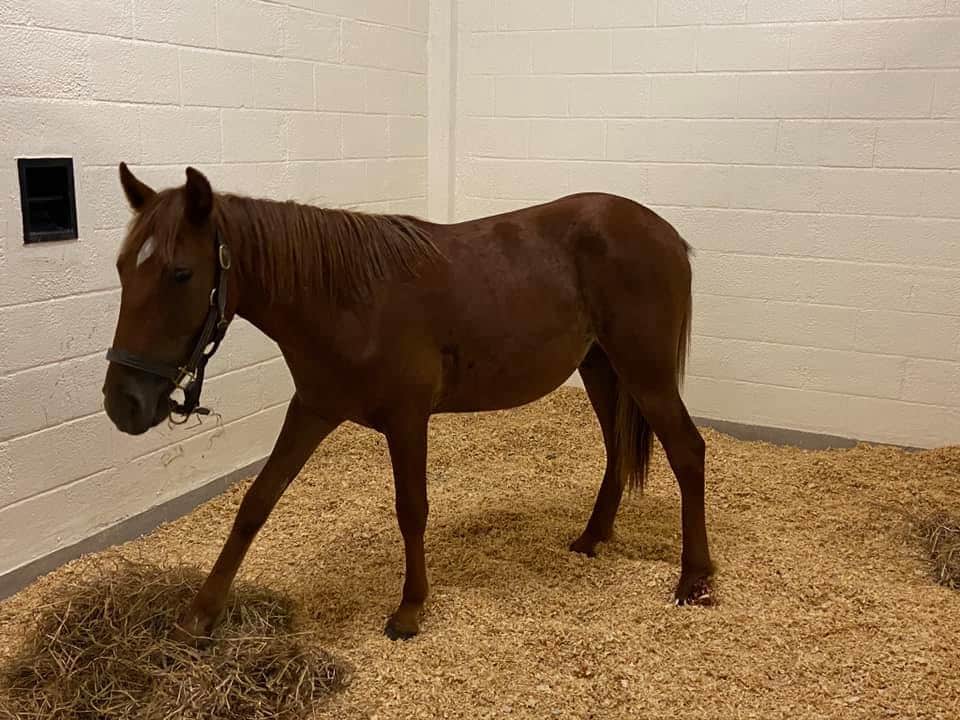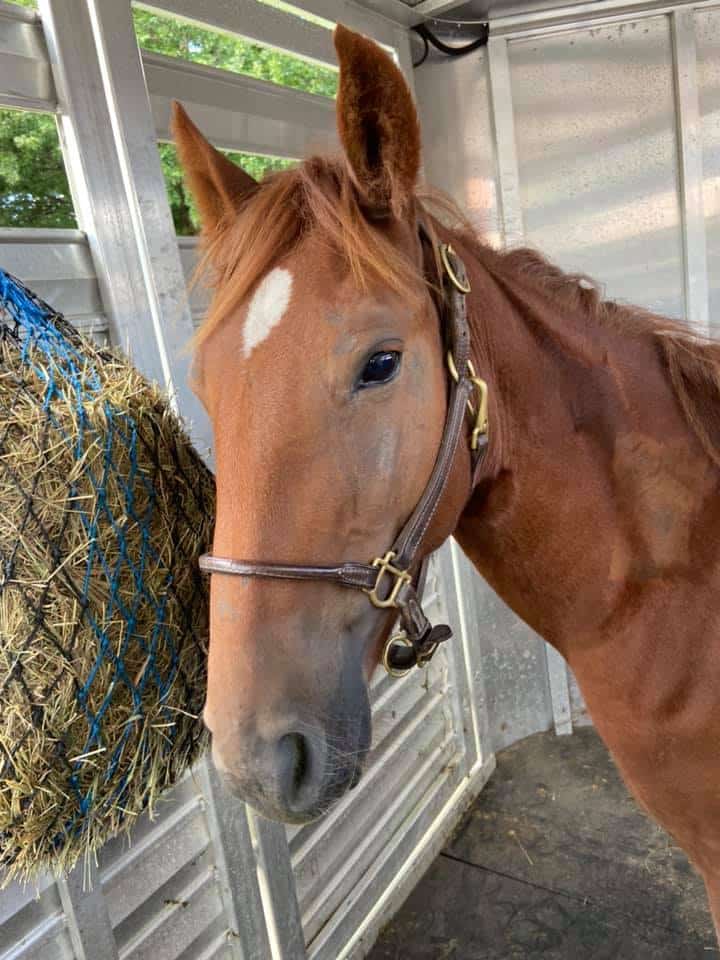
If you’ve caught yourself thinking “[The Corolla Wild Horse Fund] sure has been kind of quiet” anytime over the last 42 days, you would be correct. We have been dealing with a critical medical emergency with one of the (now formerly wild) horses. It’s taken 6 weeks to get him to the point where we are cautiously optimistic that he is going to fully heal from his injury, even though he is not quite out of the woods yet.
Meet Riptide, our latest rescue. Support the horses ➡️ https://www.corollawildhorses.com/support-corolla-wild-horse-fund/
Posted by Corolla Wild Horse Fund on Sunday, September 27, 2020
The first week of August, we received a call that yearling colt Riptide had an open, bleeding wound on the lower part of his hind left leg. As is our policy, we located him and got photos and video that were immediately passed along to our vet. Riptide was sound, and showing no real signs of illness or discomfort. Our vet advised us to monitor him closely and document the wound every day so that we could track any changes.
About midway through that first week, we noted that the wound seemed to be growing in size. Our vet recommended that Riptide be captured and treated as soon as possible. The location of the wound (right above his hoof, close to the ground) and the fact that it was growing in size was definitely cause for alarm. We were advised to transport Riptide directly to the hospital at North Carolina State University as soon as we were able to capture him.
On August 14 we caught Riptide after several hours of tracking his family. We left the beach and took him straight to Raleigh. Suffice it to say, it was one of the most physically and emotionally difficult rescues our current team has ever experienced. We made it to the hospital late that night, and it was a huge relief to get Riptide into a stall where he settled in almost immediately and was finally where he needed to be to receive the care he required to save his life.

Because Riptide arrived at the hospital completely wild, the vets and staff there faced some challenges that are not present with domesticated patients. You can’t just walk up to a scared, wild horse and safely get a needle into a vein, or examine a wound on a back foot without getting kicked, or get them to eat medication mixed in with their feed when they don’t even know what grain is. But the staff at NCSU were patient and creative, and worked closely with us as well as other colleagues to figure out the best ways to get Riptide the care he needed without traumatizing him or causing additional issues like colic or laminitis.
Within the first couple days, they were able to get Riptide safely anesthetized so that the wound on his leg could be examined and cleaned. Once the granulated tissue around the wound was surgically removed and a biopsy taken, it was discovered that Riptide was suffering from a fungal infection that had entered his body through the open wound. He most certainly would not have survived had we left him in the wild.
For several weeks, Riptide received regional limb perfusions every couple of days, regular cleaning of the wound and re-bandaging, and was obviously monitored 24/7 for any changes to his vital signs (of which there were many). It is truly hard to put all that he went through into words. Those first weeks are a bit of a blur now.
In the beginning we took things hour by hour, and after the first couple weeks, day by day. He developed an abscess at the site on his hip where he was darted with sedative the first time he went into surgery, and still has several open incisions on his hip and leg to allow the infection from the abscess to drain. His temperature and white blood cell count went up and down, and had to be treated accordingly.

Several full-body ultrasounds were performed to check for inflammation or other pockets of infection. He developed vascular complications from the IV catheter. Every day there was a new issue to address but the team at NCSU stayed on top of it. Luckily, the wound on his leg ultimately responded wonderfully to treatment and the vets were also able to get the fungal infection under control and treated before any damage was done to the rest of Riptide’s leg.
After five very, very long weeks, we got the call last Saturday that Riptide was ready to come home. He is not fully recovered, and still requires intensive care from us, but the vets at NCSU felt comfortable sending him home with the instruction to bring him back to the hospital immediately should he show the slightest signs of regression.

It’s been almost a week since he’s been home and in that time his temperature has remained normal, the wound on his leg is clean and continues to heal, and the fluid we flush out of his abscess sites every day is clean and clear. His appetite is great, he is drinking plenty of water, and is bright and alert.
We are working to slowly and carefully help him gain the weight back that he lost during his battle at the hospital, and he’s even gotten his feet trimmed. Spending five weeks in ICU was a crash course in domestication, but Riptide has adapted so well. He is so sweet and good-natured, and very brave and well-behaved for his care and treatment.
It would be easy to simply say that Riptide is one lucky horse, but in reality he is home now because there have been so many people who worked tirelessly to get him to this point. From the person who first reported the injury, to our staff who monitored him and then got him off the beach, our local vets who so fully embrace and respect our mission and the significance of these horses, the entire team at NCSU who not only treated Riptide’s physical issues but also took care of his emotional needs and showed him so much love and compassion while he was at the hospital, to all of YOU who support our organization and make it possible for us seek out this level of care and put so many resources into saving their lives when they need our help – that is why Riptide is alive today.
As you can imagine, Riptide racked up a hefty bill while he was NC State, and continues to require regular treatment and follow-up exams. If you are able to donate and help us cover these costs, we so greatly appreciate it. Every single dollar makes a difference! We also understand that things are tight for so many people these days; sharing this post also makes a difference, as do good vibes and positive thoughts.
Now that we can step back and breathe a little easier, we will bring you regular updates on Riptide’s progression. Join us here on Facebook, this Sunday at 10am EST for a live video where we will introduce him to everyone – he is already a ham for the camera! During that time we will do our best to answer any questions you have and talk about what the future has in store for this special colt.
Make a one time donation through our website and put “Riptide” in the notes/comment section: https://www.corollawildhorses.com/one-time-donations/ Checks can be mailed to CWHF, PO Box 361, Corolla NC 27927. Donations made via Facebook are secure, and 100% of the proceeds come directly to CWHF.
